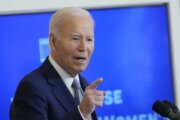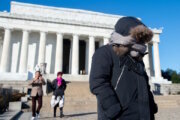NEW DELHI (AP) — A diplomatic row that has strained bilateral relations between India and Canada for over a year has boiled over as the countries expelled each other’s top diplomats over the killing of a Sikh activist in Canada and allegations of other crimes there.
Experts say the standoff will make it difficult for both countries to move forward with a once-promising partnership, and could impact India’s ambitions as it tries to project itself as a rising world power.
“India-Canada bilateral relations, which have been on a downslide since last year, will take a further hit, which will take a long time to repair,” said Praveen Donthi, senior analyst with the International Crisis Group.
Monday’s tit-for-tat expulsions came after Canada told India on Sunday that its top diplomat in the country is a person of interest in the 2023 assassination of Sikh activist Hardeep Singh Nijjar, and that police have uncovered evidence of an intensifying campaign against Canadian citizens by agents of the Indian government.
Canadian Foreign Minister Mélanie Joly tied five other expelled Indian officials to Nijjar’s assassination and said Canada had gathered “ample, clear and concrete evidence which identified six individuals as persons of interest in the Nijjar case.”
India foreign ministry rejected the accusations as absurd, and said it was expelling Canada’s acting high commissioner and five other diplomats in response.
New Delhi’s anxieties about Sikh separatist groups have long been a strain on its relationship with Canada, where some 2% of the population is Sikh. India has increasingly accused Prime Minister Justin Trudeau’s government of giving free rein to Sikh separatists from a once-strong movement to create an independent Sikh homeland known as Khalistan.
Nijjar was a local leader of the Khalistan movement, which is banned in India. India designated him a terrorist in 2020, and at the time of his death was seeking his arrest for alleged involvement in an attack on a Hindu priest in India.
Canadian police said Nijjar was shot as he was leaving the parking lot of the Sikh temple where he served as president in British Columbia on June 18, 2023. He suffered multiple gunshot wounds and died at the scene.
India’s foreign ministry in its statement Monday ascribed Canada’s allegations to the “political agenda of the Trudeau government.” The Canadian leader faces national elections next year.
Michael Kugelman of the Wilson Center, an American think tank, said India’s strong reaction is partly explained by how publicly Canada has made its accusations.
“New Delhi is extremely sensitive to any external criticism of its policies. And yet Canada isn’t only criticizing Indian policy. Its government, on the highest levels, is publicly voicing some of the most serious allegations that another government can make,” he said.
Last year, in response to similar allegations made by Trudeau, India told Canada to remove 41 of its 62 diplomats in the country.
Kugelman said the relationship is on “life support right now” and India’s concerns about the Khalistan movement in Canada “is essentially holding the relationship hostage.”
Canada is not the only country that has accused Indian officials of plotting an association on foreign soil.
Last year, U.S. prosecutors said an Indian government official directed a failed plot to assassinate another Sikh separatist leader in New York. The official was neither charged nor identified by name, but was described as a “senior field officer” with responsibilities in security management and intelligence.
New Delhi at the time expressed concern and said India takes it seriously. On Monday, the U.S. State Department said an Indian inquiry committee set up to investigate the plot would travel to Washington on Tuesday as part of its ongoing investigations.
The Biden administration wants to see India cooperate with Canada on its investigation, State Department spokesman Matthew Miller said Tuesday. He said Tuesday’s meeting was a follow-up on conversations with India’s government “at the seniormost levels over the past several months.” India has told the U.S. it is taking the allegations seriously, he said.
Canada’s foreign minister on Monday said India had refused to cooperate in the Canadian investigation.
Donthi said India’s diplomatic posturing against Canada was more aggressive because of the relatively low stakes.
“The U.S.-India relations also have a larger geopolitical framework and context,” Donthi said, adding that India’s strong reaction was also meant to deliver a message to Prime Minister Narendra Modi’s supporters at home.
“Any public criticism is anathema to the Indian government, which is personified by Modi. Such aggressive reaction is aimed at the international community and, more importantly, at Modi’s domestic constituency,” he said.
Yet, experts say the standoff could have ramifications for Modi’s ambitions as he seeks to cast India as a rising global power and grows closer to the U.S., which like India is watching China’s growing assertiveness with concern.
Donthi said the growing rift between India and Canada will also “impact the growing strategic understanding between the U.S. and Western democracies” that are wooing New Delhi as a counterweight to Beijing.
“The Canadian allegations against India come against the grain, as New Delhi has been enjoying a favorable external environment,” Donthi said. “This will throw a spanner in the works for India’s great power ambitions.”
Roland Paris, a professor of international affairs at the University of Ottawa and a former senior foreign policy adviser to Trudeau, said India claims to be a rule of law democracy and should act like one.
“The allegations that the Indian government orchestrated a campaign of violence on the territory of another country is startling. We can and should expect better from a fellow democracy,” Paris said.
___
Associated Press writers Rob Gillies in Toronto and Matthew Lee in Washington contributed.
Copyright © 2024 The Associated Press. All rights reserved. This material may not be published, broadcast, written or redistributed.





